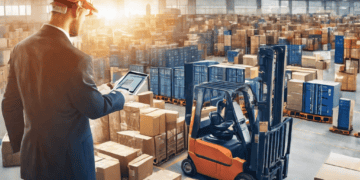The landscape of the current supply chain is in the midst of a notable evolution driven by technological advancements. The potential within artificial intelligence hints at a future supply chain that could function autonomously and self-orchestrate its operations. Various technologies, such as unmanned mobile robots, drones for online fulfillment, blockchain architectures, wearables, mobile robots, machine learning, and IoT platforms, are promising to revolutionize the logistics industry.
The forthcoming supply chain is anticipated to be more streamlined, swifter, and importantly, self-operating. The pace of this transformation will be fueled by a handful of radical technologies that industry players are expected to cautiously adopt within the next 15 years. Frost & Sullivan’s comprehensive analysis on the Future of Logistics highlights the top five technologies for the technology-driven logistics scenarios anticipated by 2030.
Technology Scenario 1: Autonomous Fleet Enhances Efficiency
While drones have gained significant attention, other types of autonomous fleets within the industry are making strides. Vision-guided fully autonomous mobile robots, initially developed for warehouses, have significantly addressed unproductive tasks such as manual travel. These robots not only improve warehouse tasks but also accelerate order processing, achieving a fourfold increase in speed compared to human capabilities.
The prospect of completely autonomous fleets, including truck platooning and autonomous trucks, by 2030 is a real possibility. Rolls Royce’s plans for autonomous cargo ships by the same year indicate the industry’s movement toward autonomy. The emphasis on autonomy, apart from aiding or replacing manpower, particularly focuses on fuel economy, with truck platooning potentially saving up to 20 percent on fuel costs.
In addition to fuel considerations, the emergence of Big Data as an influential force within the industry is becoming apparent, shifting the focus toward “Good Data.”
Technology Scenario 2: Data Overtakes Fuel as the Primary Influence
The conversation surrounding Big Data has shifted from its volume to its variety and value. Companies like Amazon are pioneering predictive analytics around consumer behavior to preemptively fulfill orders, aiming for almost instantaneous deliveries. Concepts like “anticipatory shipping” are being explored, where deliveries are initiated to approximate locations, shortening the fulfillment time once orders are placed. This progression signifies a potential shift towards a data-centric approach where information’s value surpasses the physical movement of goods.
Technology Scenario 3: Rise of Non-Asset Centric Players
Although the logistics industry continues to depend on asset ownership and operation, a new wave of logistics providers is emerging without direct asset ownership. Companies like Shyp and Zipments aggregate information about assets from multiple sources, offering competitive services due to their asset-free models. This trend suggests a potential transformation where logistics providers evolve into consulting-driven entities, focusing on project management rather than direct cargo movement.
Technology Scenario 4: E-Brokerage Platforms Revolutionize Freight Management
The growth of e-retail and connectivity technologies is expected to usher in a new era for freight and logistics firms. Mobile-based freight brokerage solutions are anticipated to automate various processes related to delivery, dispatch, load-finding, and driver payment. These platforms aim to optimize asset utilization and fuel efficiency, potentially minimizing operational costs.
Technology Scenario 5: Blockchain Innovations Enable Smart Commerce
Blockchain technology is poised to revolutionize supply chain networks by enhancing transparency and compliance. It offers opportunities for smart contracts, sensorization of goods, and real-time information access, ensuring secure and efficient transactions throughout the supply chain.
The Future: A Self-Orchestrated Supply Chain
These advancements in technology signify a shift towards intelligent supply chains, offering significant competitive advantages. Predictions foresee a future with nearly instantaneous product delivery, reduced warehouse sizes, and increased autonomy in fleet operations. The transformation of the supply chain into a data-driven, technology-centric domain indicates substantial potential gains for businesses willing to adapt early.
In conclusion, the logistics and supply chain industry is on the brink of a significant transformation, and embracing these technological advancements promises immense opportunities for those prepared to seize them.
Explore top supply chain logistics news at The Supply Chain Report. Interested in international trade? Visit ADAMftd.com for free tools.
#FutureOfLogistics #SupplyChainInnovation #AutonomousFleet #ArtificialIntelligenceInLogistics #BigDataInSupplyChain #SmartCommerce #BlockchainTechnology #EBrokerageRevolution #UnmannedMobileRobots #DronesInFulfillment #SupplyChainAutomation #PredictiveAnalytics #IoTInLogistics #MachineLearningInSupplyChain #LogisticsTransformation #TechDrivenLogistics #DataCentricLogistics #AutonomousTrucks #TruckPlatooning #WarehouseRobots #SmartContracts #DigitalSupplyChain #InnovationInLogistics #SelfOrchestratingSupplyChain #SupplyChainEvolution
















